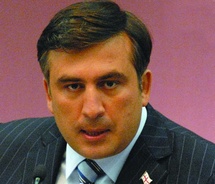
The main instigators, such as former parliament speaker Nino Burjanadze or flamboyant ex-foreign minister Salome Zurabishvili, are demanding radical actions to force Saakashvili to step down.
"Saakashvili will not resign just because of the opposition's sophisticated statements," Burjanadze on Wednesday told journalists.
"Strong measures are needed to change these authorities."
For such "strong measures" the opposition plans to block railway and key highways in Georgia, a country which is seen as an important energy-transit route between the Caspian region and the West.
But for the other opposition leaders, such as Saakashvili's former ambassador to the UN Irakli Alasania, the strong measures are "unacceptable".
"We will never take part in blocking strategic objects," he said reiterating readiness to "engage in a meaningful dialogue with the authorities" on a range of issues to improve democratic practices in the country."
Several other opposition leaders decided to quit the opposition grouping which has since April 9 staged daily protests against Saakashvili's rule.
Cracks in the opposition appeared at the culmination point when Georgians packed the 55,000 capacity national football stadium in a highly emotional rally.
Such differences in the ranks of the opposition may fritter away the energy from the protests and weaken the opposition's ability to further consolidate supporters against Saakashvili.
Opponents accuse Saakashvili of mishandling the conflict with Russia and of becoming increasingly autocratic since he came to power after the peaceful 2003 Rose Revolution.
Opposition protests with pickets outside public buildings and blocked traffic at the main thoroughfares in Tbilisi disrupted daily life and governmental operations.
But the authorities did not intervene with protests as they have been keen to avoid a repeat of events in November 2007, when riot police forcefully dispersed thousands of anti-government protesters, damaging Saakashvili's reputation and giving a boost to opposition forces.
Saakashvili shrugged off the protests as "no surprise" and suggested that demonstrators were recruited by the opposition from the ranks of bureaucrats who lost their jobs due to reforms.
-------------------------------------------------------------------------------------------------------------
"Saakashvili will not resign just because of the opposition's sophisticated statements," Burjanadze on Wednesday told journalists.
"Strong measures are needed to change these authorities."
For such "strong measures" the opposition plans to block railway and key highways in Georgia, a country which is seen as an important energy-transit route between the Caspian region and the West.
But for the other opposition leaders, such as Saakashvili's former ambassador to the UN Irakli Alasania, the strong measures are "unacceptable".
"We will never take part in blocking strategic objects," he said reiterating readiness to "engage in a meaningful dialogue with the authorities" on a range of issues to improve democratic practices in the country."
Several other opposition leaders decided to quit the opposition grouping which has since April 9 staged daily protests against Saakashvili's rule.
Cracks in the opposition appeared at the culmination point when Georgians packed the 55,000 capacity national football stadium in a highly emotional rally.
Such differences in the ranks of the opposition may fritter away the energy from the protests and weaken the opposition's ability to further consolidate supporters against Saakashvili.
Opponents accuse Saakashvili of mishandling the conflict with Russia and of becoming increasingly autocratic since he came to power after the peaceful 2003 Rose Revolution.
Opposition protests with pickets outside public buildings and blocked traffic at the main thoroughfares in Tbilisi disrupted daily life and governmental operations.
But the authorities did not intervene with protests as they have been keen to avoid a repeat of events in November 2007, when riot police forcefully dispersed thousands of anti-government protesters, damaging Saakashvili's reputation and giving a boost to opposition forces.
Saakashvili shrugged off the protests as "no surprise" and suggested that demonstrators were recruited by the opposition from the ranks of bureaucrats who lost their jobs due to reforms.
-------------------------------------------------------------------------------------------------------------









 Home
Home Politics
Politics









